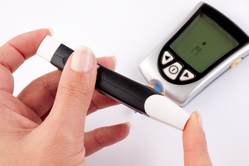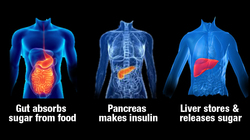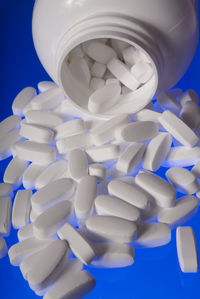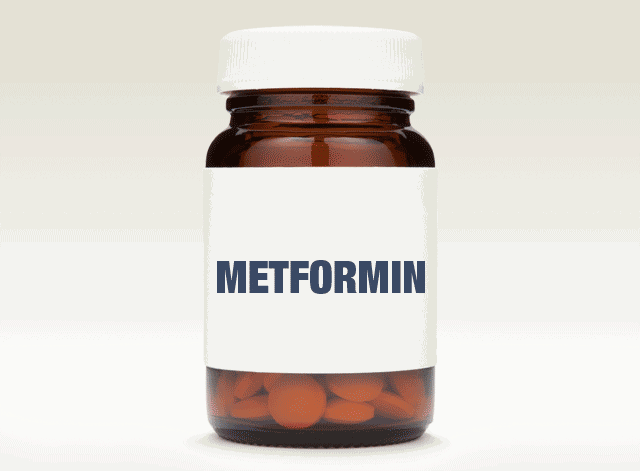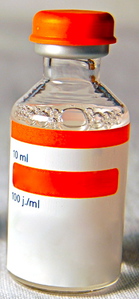Kidney Disease May Change Your Dose of Diabetes Medicines
If you have diabetes, or high blood sugar, you may be taking medicines to help control your blood sugar. If your kidneys don’t work well, some of these medicines could last longer than normal or build up to unsafe levels in your blood. (Healthy kidneys remove these medicines.) So, your dose of diabetes medicines may need to change if you have kidney disease or if your kidneys fail. If you would like to learn more about diabetes and kidney disease, visit How to Slow Kidney Disease: When You Have Diabetes.
Sugar in Your Body
Use of sugar (glucose) in your body is complex. Most Americans eat far more sugar than our bodies need, as sweets and as starches like potatoes, rice, corn, and other grains. When we eat sugar, it is first absorbed in the gut.
Your pancreas makes enzymes that help you digest your food. It also makes insulin, a hormone that keeps blood sugar levels in check.
Your liver makes bile to help you digest your food. It also stores glucose and releases it if your body needs more.
Drug Classes for Type 2 Diabetes
If you have diabetes, your doctor may prescribe pills to help control your blood sugar. There are six classes of diabetes pills. They work on your gut, your pancreas, your liver, your cells, or more than one of these:
- Sulfonyureas tell your pancreas to make more insulin.
- Meglitinides also tell your pancreas to make more insulin—but only when your blood sugar is high.
- Dipeptidyl peptidase IV (DPP-IV) inhibitors, like meglitinides, tell your pancreas to make more insulin when your blood sugar is high. They also tell your liver to stop making so much sugar.
- Thiazolidinediones (TZDs) make cells more sensitive to insulin so they take more sugar out of the blood, and help the liver to make less glucose.
- Biguanides help insulin move into your cells and keep your liver from releasing glucose it has stored.
- Alpha-glucosidase inhibitors block digestion of starch in your gut so blood sugar does not go up as fast.
Some diabetes drugs combine more than one of these classes into one pill.
Avoid Metformin if You Have Severe CKD
Metformin is a strong and helpful diabetes medicine. It can be used safely in early kidney disease. But, it is NOT SAFE for you if your kidney disease is severe. If you take metformin (by any name), talk to your doctor about when you may need to switch to a drug that is safer for you.
Talk to your doctor before you stop taking any drug he or she prescribed for you.
Kidney Disease May Lower Your Need for Insulin
If you use insulin, your dose may change if you have chronic kidney disease. The kidneys help remove insulin from your blood. When your kidneys don’t work as well, less insulin may give you the same effect—or you may have more low blood sugars.
In fact, having more low blood sugars can be a sign that it’s time to have your kidneys checked. Testing your blood sugar as often as your care team advises can help you stay on track.
Talk with your care team about diabetes goals for your stage of kidney disease. The VA has classes to help you manage your diabetes and kidney disease. There are several helpful diabetes websites, too. Try Medline* or the National Diabetes Education Program.*
To learn more about the stages of CKD and how to manage them visit Kidneys and Kidney Disease.
* Links will take you outside of the Department of Veterans Affairs website. VA does not endorse and is not responsible for the content of the linked websites.
Diabetes Drugs
- Your dose of diabetes medicines may change if you have a kidney problem because:
Not scored Always tell your care team and pharmacist about your kidney function when a new medication is prescribed. You may need a lower dose, or even a different medication.
- Your liver plays a role in how your body uses sugar:
Not scored Your liver stores sugar and releases it into your blood if you need more.
- Diabetes pills target your gut, liver, muscle cells, or:
Not scored Your gut, liver, muscles, and pancreas all play a role in how your body uses sugar. So, diabetes pills act on one or more of these organs.
- Biguanide diabetes drugs (like metformin) are not safe for you if you have a kidney problem:
Not scored If you take a biguanide, talk with your care team about when it is time to switch to something else.
- If your kidneys are not working well, you may need more insulin (if you use insulin):
Not scored When your kidneys don’t work well, they don’t do as good of a job taking insulin out of your blood. This means that you may need less insulin than you are used to. In fact, needing less insulin may be a sign that your kidneys don’t work as well as they did.













